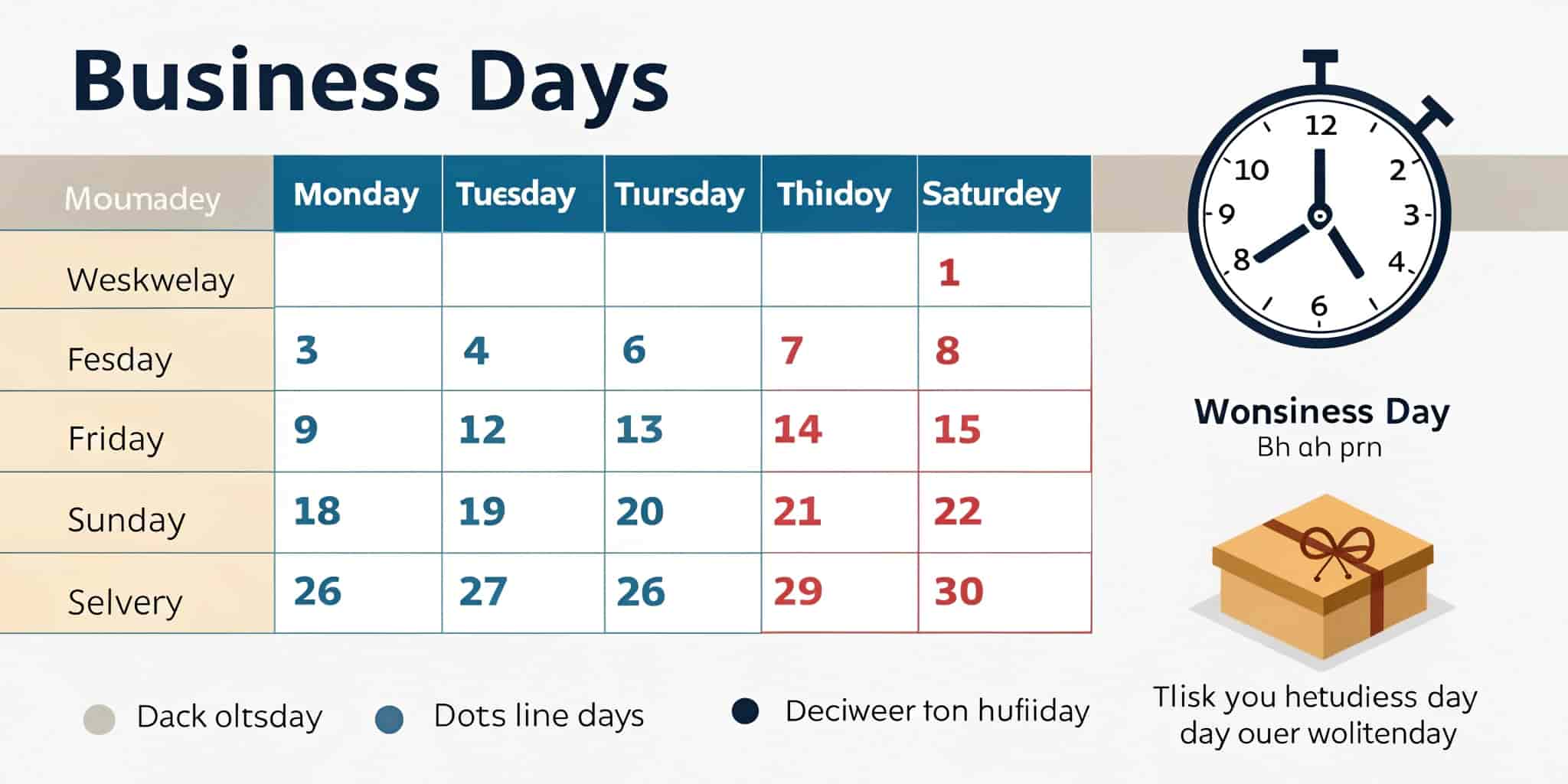Before we start exploring business days, let’s think about why this topic is relevant today. In a world that’s fast-paced and highly connected, the term “business day” is something we often hear. Whether you’re waiting for a package delivery or tracking a financial transaction, business days come up frequently. But what do they really mean, and why should we care?
In simple terms, a business day is the time during which most businesses are open and working. However, as you’ll see, there’s more to it than just the typical 9-to-5. Understanding business days is important because it affects many aspects of our daily lives, from finance to shipping and even international business. Let’s take a closer look at the concept.
What Are Business Days?
A business day is generally considered to be any day when regular business operations are taking place, typically Monday through Friday. It usually spans the hours from 9 a.m. to 5 p.m. local time. What’s important to note is that weekends (Saturday and Sunday) and public holidays are not included in the count of business days.

So, if you’re waiting for a financial transaction or an order to arrive, the days that count are business days, not weekends or holidays. For example, if you place an order on a Thursday and the delivery time is five business days, those five days will not include the weekend (Saturday and Sunday) or public holidays. As a result, the package may arrive later than expected.
The Origins Of Business Days – Need To Know!
To understand where the idea of business days comes from, let’s look at its history. The concept of business days started to become more structured as commerce became more organized during the Industrial Revolution. Before this period, business hours were not as standardized, and they varied greatly from region to region. However, the rise of stock exchanges and larger corporations in the 19th century led to a more uniform approach to business hours.
In the United States, for example, the Monday-to-Friday schedule became the standard because of factors like labor laws, the growth of industries, and the development of banking systems. Over time, this concept spread to other countries, although the definition of business days can vary depending on the local customs and laws.
Standard Business Days Around The World – How They Shape Your Work Globally!
Business days can vary significantly from one country to another due to cultural, religious, and governmental differences. Let’s explore how different regions define their business days.
North America:
United States And Canada:
- Business Days: Monday to Friday
- Business Hours: Generally from 9 a.m. to 5 p.m.
Notes: Both countries observe similar public holidays, which can affect business days.
Europe:
United Kingdom, Germany, France:
- Business Days: Monday to Friday
- Business Hours: Typically from 9 a.m. to 5 p.m., though some businesses may operate until 6 p.m.
Notes: European Union regulations can standardize certain business practices, but local holidays still vary.
Middle East:
United Arab Emirates (UAE):
- Business Days: Monday to Friday (recent change from Sunday to Thursday)
- Business Hours: Generally from 8 a.m. to 5 p.m.
Notes: In 2022, the UAE shifted its weekend to Saturday and Sunday to align with global markets.
Saudi Arabia:
- Business Days: Sunday to Thursday
- Business Hours: Typically from 8 a.m. to 5 p.m.
Notes: Friday is a holy day in Islam, so the weekend includes Friday and Saturday.
Asia:
Japan:
- Business Days: Monday to Friday
- Business Hours: From 9 a.m. to 6 p.m.
Notes: Some businesses may operate on Saturdays.
Pakistan:
- Business Days: Monday to Friday
- Business Hours: Typically from 9 a.m. to 5 p.m.
Notes: Some businesses, especially retail, may operate on Saturdays.
India:
- Business Days: Monday to Friday, but many businesses also operate on Saturday
- Business Hours: Typically from 9 a.m. to 6 p.m.
Notes: Saturdays are often considered half-days.
Africa:
South Africa
- Business Days: Monday to Friday
- Business Hours: Generally from 8 a.m. to 5 p.m.
Notes: Government offices may close earlier on Fridays.
Latin America
Brazil
- Business Days: Monday to Friday
- Business Hours: From 8 a.m. to 6 p.m.
Notes: Some retail businesses operate on Saturdays.
Mexico
- Business Days: Monday to Friday, with Saturday being a workday for some sectors
- Business Hours: Typically from 9 a.m. to 6 p.m.
Notes: The workweek can extend to Saturday in industries like retail and manufacturing.
Case Studies
- Israel: The business week runs from Sunday to Thursday, with Friday and Saturday as the weekend due to the Jewish Sabbath.
- Nepal: The workweek is Sunday to Friday, with Saturday as the only weekend day.
Why Does This Matter In Today’s World? – Their Importance For Better Planning!
Now, you might be wondering, why is understanding business days important today? After all, it’s just a way to measure time, right? Actually, there’s more to it. The concept of business days is crucial for several reasons in today’s interconnected world:

- Financial Transactions: In the financial world, business days are key to managing transactions. For instance, if you deposit a check or make a stock trade, it will take a certain number of business days for the transaction to be processed. Understanding this is important to avoid confusion about when the transaction will be complete.
- Global Business: As companies and individuals increasingly engage in global trade, understanding how business days work in different countries becomes important. What constitutes a business day in one country might not be the same in another.
- Service Expectations: Business days are often used to communicate when goods or services will be provided. For example, if you order something online and the company promises delivery in 5 business days, knowing that weekends don’t count can help manage your expectations.
The Opportunities Business Days Provide – Dont Miss Out!
Now that we’ve covered the basics, let’s look at how the concept of business days can be useful in today’s world. Understanding business days opens up new possibilities for businesses and consumers alike. Here are some ways it works:
Financial Transactions and Settlements:
One area where business days are important is in financial transactions. For example, if you deposit a check at your bank, it will take a certain number of business days for the bank to process the deposit and clear the check. This helps ensure the funds are legitimate and that fraud is prevented. Similarly, in the stock market, trades are usually settled after a specific number of business days. Many stock markets use “T+2,” meaning that stock transactions settle two business days after the trade is made.
International Trade and Cross-Border Business:
When it comes to international business, business days play a key role in managing transactions across countries. For example, many Middle Eastern countries follow a Sunday-through-Thursday workweek, with Friday and Saturday being their weekend. This means that if you’re conducting business with a company in that region, your calculations for business days may need to account for this difference.
Efficient Planning for Businesses and Consumers:
For businesses, knowing when business days fall is important for things like delivering goods, meeting deadlines, or managing employee schedules. If a company promises to ship a product within three business days, knowing when those three days occur will help ensure the promise is kept. Similarly, consumers can better track when they can expect delivery or service, making for a smoother experience.
Calculating Business Days – Easy Steps To Manage Deadlines Effectively!
Accurately calculating business days is essential to meet deadlines and manage expectations.
| Scenario | Start Date | Business Days to Add | Calculation | Deadline |
| Domestic (USA) | Monday, May 1 | 5 | Tuesday (1), Wednesday (2), Thursday (3), Friday (4), Monday (5) | Monday, May 8 |
| International (USA to UAE) | Thursday, June 15 | 5 | Friday (1), Monday (2), Tuesday (3), Wednesday (4), Thursday (5) | Thursday, June 22 |
| Holiday Impact (USA) | Thursday, Dec 22 | 5 | Friday (1), Monday (2 – Excludes Christmas), Tuesday (3), Wednesday (4), Thursday (5) | Thursday, December 29 |
Challenges And Considerations In The Business Day System:
While the concept of business days is useful, it does come with a few challenges. Let’s explore some of them:

Public Holidays:
One issue that can complicate business day calculations is public holidays. Public holidays are days when most businesses close, meaning that they don’t count as business days. For example, if a service is expected to be provided in three business days, and one of those days falls on a public holiday, the delivery or transaction could be delayed.
Different countries and regions have their own public holidays, which can affect both domestic and international transactions. So, if you’re expecting a transaction or delivery, it’s always a good idea to consider whether any public holidays may interfere with the timeline.
International Variations:
Another challenge is that business days aren’t the same everywhere. Different countries have different workweek patterns, which can affect how business days are calculated. For example, countries like India, Mexico, and Colombia typically follow a Monday-to-Saturday workweek, which means Saturday is a business day in these regions. On the other hand, many Middle Eastern countries consider Friday and Saturday to be their weekend, which makes Sunday the first business day of the week.
Technology and the Blurring of Traditional Business Hours:
With technological advancements, the traditional concept of business hours is starting to blur. Many businesses operate online, and transactions can happen 24/7. However, despite this shift, financial institutions, shipping companies, and other service providers still operate based on the standard business day system. This means that while communication and transactions can happen at any time, the processing of certain transactions may still be delayed if they fall outside of business hours.
Read More: Coyyn.Com Business – Simplify Your Business And Grow Faster!
What Are Business Days For Shipping, Banks, And Amazon?
- Business Days for Shipping: Shipping companies like FedEx and UPS operate Monday to Friday, excluding weekends and holidays. For example, “2 business days shipping” means delivery two working days after shipment, not counting weekends or public holidays.
- Business Days for Banks: Banks process transactions Monday to Friday, excluding holidays. For instance, depositing a check on Friday might mean funds are available by Monday or Tuesday. International transactions may take longer due to varying workweeks in different countries.
- Business Days for Amazon: Amazon uses business days (Monday to Friday, excluding holidays) for delivery timelines. For “1-2 business days shipping,” weekends are excluded unless special options like “Same-Day Delivery” are chosen. Delivery estimates are always calculated based on business days.
How Modern Developments Are Changing Business Days?
Technology and changing work habits are reshaping the concept of business days.
- 24/7 Global Economy: E-commerce enables round-the-clock shopping, with customers expecting immediate responses. This shift increases the demand for businesses to operate outside traditional hours, and companies must adjust to this constant demand for availability.
- Remote Work And Flexible Hours: Employees now work beyond standard hours, especially in global teams. Companies must coordinate across multiple time zones to ensure seamless collaboration. Flexible schedules allow for better work-life balance and productivity.
- Automation And AI: Automation allows tasks like order processing and support to function 24/7. This reduces dependence on human staff during business hours, allowing businesses to meet customer needs faster and more efficiently.
- Hybrid Work Models: Hybrid work allows employees to split time between the office and home. This flexibility reshapes traditional business day structures. Companies must adapt to varying work schedules across teams.
Raed More: Grow Google Business Profile Audience – Proven Tips For Instant Growth!
Future Trends – The Changing Nature Of Business Days!

Remote Work And Flexible Hours:
The rise of remote work and flexible scheduling transforms traditional business day structures, allowing for more adaptable and personalized work environments. Employees can adjust their hours to suit their needs, creating a more dynamic work culture.
Automation And AI Impact:
Automation and artificial intelligence streamline business processes, reducing the need for traditional business day operations. These technologies allow tasks to be completed faster and more efficiently, enabling businesses to operate outside standard hours.
Frequently Asked Questions:
What happens if a business day falls on a holiday?
If a business day falls on a public holiday, it is typically not counted as a business day. This means deadlines or transactions may be extended to the next business day. It’s important to account for holidays when planning schedules or deadlines.
How long is 7 business days?
Seven business days are usually counted from the first business day (excluding weekends and holidays). For example, if you start counting on a Monday, 7 business days would end the next Tuesday, skipping the weekend.
What are the business days in shipping?
In shipping, “business days” refer to the days when delivery services operate, typically Monday to Friday, excluding weekends and holidays. This affects delivery schedules, so a 5-day delivery estimate may mean more calendar days if it includes a weekend.
Do business days include weekends?
No, business days generally do not include weekends. Business days typically refer to weekdays, Monday to Friday, excluding public holidays. Weekends (Saturday and Sunday) are not considered business days.
Do business days differ by country?
Yes, different countries may have different definitions of business days. Some countries observe a Sunday-through-Thursday workweek, while others follow Monday-through-Saturday schedules.
What Are Business Days in China?
In China, business days are typically Monday through Friday, similar to the United States. However, public holidays like the Lunar New Year or National Day can affect business operations significantly. During these holidays, many businesses shut down completely, so it’s essential to plan ahead if you’re working with Chinese companies or suppliers.
Conclusion:
Business days are an essential part of how commerce and services are managed worldwide. Whether you’re awaiting a delivery, processing a financial transaction, or doing business internationally, understanding how business days work can help you stay on track and avoid confusion.
Although the standard definition of business days is widely accepted, it’s important to remember that they can differ depending on your location, the industry you’re in, and the country you’re doing business with.
Read More: